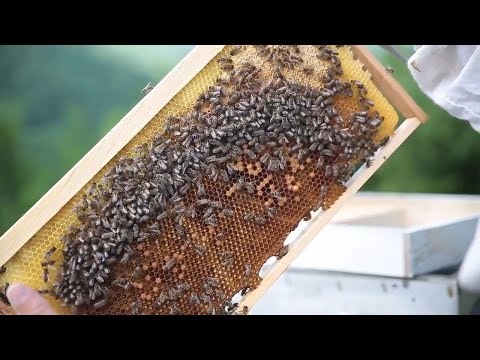(19 May 2024)
BOSNIA WORLD BEE DAY
SOURCE: ASSOCIATED PRESS
RESTRICTIONS:
LENGTH: 3:40
ASSOCIATED PRESS
Zenica, Bosnia – 17 May 2024
1. Zijad Alic, a small-scale beekeeper, spraying one of his hives with water
2. Bees in beehive
3. Alic’s hands pulling out a beehive frame covered with bees
4. Back shot of Alic examining the frame
5. Various of beehive frame covered in bees
6. Close of Alic’s face under protective beekeeper hat
7. SOUNDBITE (Bosnian) Zijad Alic, small-scale beekeeper:
“I fell in love with bees in childhood because my maternal grandmother kept bees in old woven wicker hives. I was impressed with bees and how in the fall, when she (the grandmother) would close up her hives, how she could take for herself as much honey as she needed. I was intrigued by bees and they made me fall in love with beekeeping.”
8. Alic inspecting beehive frames covered with bees
9. Close of a bees on beehive frame
10. Close of Alic’s face under protective beekeeper hat
11. Alic inspecting a beehive frame
12. SOUNDBITE (Bosnian) Zijad Alic, small-scale beekeeper:
“Climate conditions dictate everything. Everything around us is in bloom right now, as you can see, but there is no flow. Here in my stationary apiary, there is no nectar, just some pollen, but no nectar. In contrast, two or three years ago, in March, even before the forest turned green, my bees were collecting a wealth of everything, God knows how, my hives were full of (wax sealed) white (cells).”
13. Various of beehive frames covered with bees
14. Alic inspecting a beehive
15. Alic’s hands holding a beehive frame
16. Bees inside a beehive
17. Bees flying in the air
18. Munib Huseinagic, large beekeepers’ association chairman, walking in town
19. SOUNDBITE (Bosnian) Munib Huseinagic, chairman of large beekeepers association:
“Bees are under a double threat, from pathogens and from climate change; these two things significantly impact the state of our beehives, their number and their yield. Beekeepers are currently left on their own to self-finance and fight a war against those two threats.”
20. Various of bees and hives
21. SOUNDBITE (Bosnian) Munib Huseinagic, chairman of large beekeepers association:
“Our beekeeping ways are based on accumulated experience and theory, published beekeeping literature, but things have changed so drastically that all that is almost useless. We followed a completely different (foraging) schedule, with set dates, before the climate started to change, we knew precisely where and when to go and what to do.”
22. Various of jars of locally-produced honey arranged on a roadside stall
23. Almir Mrkonjic, a small-scale beekeeper standing next to his stall, talking with a customer
24. SOUNDBITE (Bosnian) Almir Mrkonjic, small-scale beekeeper:
“The climate has changed, I remember from childhood that acacia blossomed early in May, but over the past decade, it blossoms (early) and then the weather turns rainy and frosty and it kills it, (nectar) flow is only possible in acacia that has not been damaged by frost.”
25. Various of honey jars and other bee products displayed on Mrkonjic’s road-side stall
STORYLINE:
LEADIN:
Bosnia is home to hundreds of thousands of bee colonies, mainly cared for by small scale beekeepers.
But climate change is threatening the survival of their hives as the insects struggle to find nectar supplies.
STORYLINE:
Zijad Alic lovingly tends to his bees.
He has 50 hives so is considered a small scale beekeeper.
Bosnia has a rich beekeeping tradition, and most honey producers keep fewer than 100 hives.
Find out more about AP Archive: http://www.aparchive.com/HowWeWork
Twitter: https://twitter.com/AP_Archive
Facebook: https://www.facebook.com/APArchives
Instagram: https://www.instagram.com/APNews/
You can license this story through AP Archive: http://www.aparchive.com/metadata/youtube/3baf13926b7d47da879d1d2de28589c0





